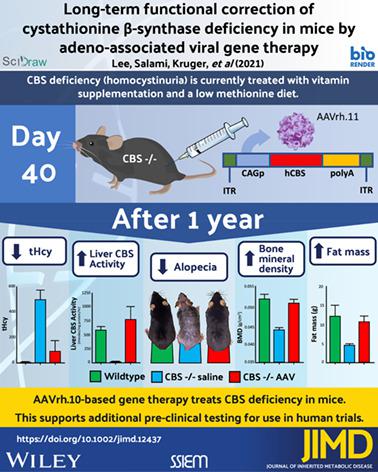当前位置:
X-MOL 学术
›
J. Inherit. Metab. Dis.
›
论文详情
Our official English website, www.x-mol.net, welcomes your
feedback! (Note: you will need to create a separate account there.)
Long-term functional correction of cystathionine β-synthase deficiency in mice by adeno-associated viral gene therapy
Journal of Inherited Metabolic Disease ( IF 4.2 ) Pub Date : 2021-09-16 , DOI: 10.1002/jimd.12437 Hyung-Ok Lee 1 , Christiana O Salami 2 , Dolan Sondhi 2 , Stephen M Kaminsky 2 , Ronald G Crystal 2 , Warren D Kruger 1
Journal of Inherited Metabolic Disease ( IF 4.2 ) Pub Date : 2021-09-16 , DOI: 10.1002/jimd.12437 Hyung-Ok Lee 1 , Christiana O Salami 2 , Dolan Sondhi 2 , Stephen M Kaminsky 2 , Ronald G Crystal 2 , Warren D Kruger 1
Affiliation

|
Cystathionine β-synthase (CBS) deficiency is a recessive inborn error of sulfur metabolism characterized by elevated blood levels of total homocysteine (tHcy). Patients diagnosed with CBS deficiency are currently treated by a combination of vitamin supplementation and restriction of foods containing the homocysteine precursor methionine, but the effectiveness of this therapy is limited due to poor compliance. A mouse model for CBS deficiency (Tg-I278T Cbs−/−) was used to evaluate a potential gene therapy approach to treat CBS deficiency utilizing an AAVrh.10-based vector containing the human CBS cDNA downstream of the constitutive, strong CAG promoter (AAVrh.10hCBS). Mice were administered a single dose of virus and followed for up to 1 year. The data demonstrated a dose-dependent increase in liver CBS activity and a dose-dependent decrease in serum tHcy. Liver CBS enzyme activity at 1 year was similar to Cbs+/− control mice. Mice given the highest dose (5.6 × 1011 genomes/mouse) had mean serum tHcy decrease of 97% 1 week after injection and an 81% reduction 1 year after injection. Treated mice had either full- or substantial correction of alopecia, bone loss, and fat mass phenotypes associated with Cbs deficiency in mice. Our findings show that AAVrh.10-based gene therapy is highly effective in treating CBS deficiency in mice and supports additional pre-clinical testing for eventual use human trials.
中文翻译:

腺相关病毒基因治疗对小鼠胱硫醚β合酶缺乏症的长期功能矫正
胱硫醚 β-合酶 (CBS) 缺乏症是硫代谢的隐性先天性错误,其特征是血液中总同型半胱氨酸 (tHcy) 水平升高。被诊断患有 CBS 缺乏症的患者目前通过补充维生素和限制含有同型半胱氨酸前体蛋氨酸的食物相结合的方式进行治疗,但由于依从性差,这种疗法的有效性受到限制。CBS 缺乏症的小鼠模型 ( Tg-I278T Cbs -/- )用于评估一种潜在的基因治疗方法来治疗 CBS 缺乏症,该方法利用含有人类CBS的基于 AAVrh.10 的载体组成型强 CAG 启动子 (AAVrh.10hCBS) 下游的 cDNA。给小鼠施用单剂量的病毒,并随访长达 1 年。数据表明肝脏 CBS 活性呈剂量依赖性增加,血清 tHcy 呈剂量依赖性降低。1 年时的肝脏 CBS 酶活性与Cbs +/-对照小鼠相似。给予最高剂量(5.6 × 10 11基因组/小鼠)的小鼠在注射后 1 周平均血清 tHcy 下降 97%,注射后 1 年下降 81%。接受治疗的小鼠与Cbs相关的脱发、骨质流失和脂肪量表型得到完全或实质性纠正小鼠缺乏。我们的研究结果表明,基于 AAVrh.10 的基因疗法在治疗小鼠 CBS 缺乏症方面非常有效,并支持最终使用人体试验的额外临床前测试。
更新日期:2021-11-09
中文翻译:

腺相关病毒基因治疗对小鼠胱硫醚β合酶缺乏症的长期功能矫正
胱硫醚 β-合酶 (CBS) 缺乏症是硫代谢的隐性先天性错误,其特征是血液中总同型半胱氨酸 (tHcy) 水平升高。被诊断患有 CBS 缺乏症的患者目前通过补充维生素和限制含有同型半胱氨酸前体蛋氨酸的食物相结合的方式进行治疗,但由于依从性差,这种疗法的有效性受到限制。CBS 缺乏症的小鼠模型 ( Tg-I278T Cbs -/- )用于评估一种潜在的基因治疗方法来治疗 CBS 缺乏症,该方法利用含有人类CBS的基于 AAVrh.10 的载体组成型强 CAG 启动子 (AAVrh.10hCBS) 下游的 cDNA。给小鼠施用单剂量的病毒,并随访长达 1 年。数据表明肝脏 CBS 活性呈剂量依赖性增加,血清 tHcy 呈剂量依赖性降低。1 年时的肝脏 CBS 酶活性与Cbs +/-对照小鼠相似。给予最高剂量(5.6 × 10 11基因组/小鼠)的小鼠在注射后 1 周平均血清 tHcy 下降 97%,注射后 1 年下降 81%。接受治疗的小鼠与Cbs相关的脱发、骨质流失和脂肪量表型得到完全或实质性纠正小鼠缺乏。我们的研究结果表明,基于 AAVrh.10 的基因疗法在治疗小鼠 CBS 缺乏症方面非常有效,并支持最终使用人体试验的额外临床前测试。











































 京公网安备 11010802027423号
京公网安备 11010802027423号